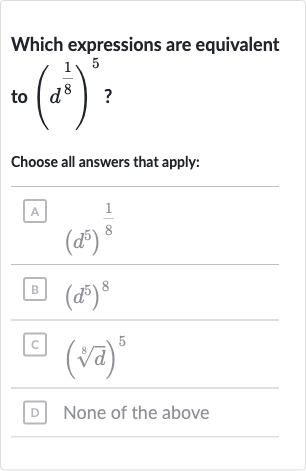Full solution
Q. Which expressions are equivalent to ?Choose all answers that apply: None of the above
- Evaluate Power Rule: Evaluate the given expression using the power of a power rule.The power of a power rule states that .So, .
- Check Option A: Check option A: . Using the power of a power rule, . This is equivalent to the original expression.
- Check Option B: Check option B: . Using the power of a power rule, . This is not equivalent to the original expression.
- Check Option C: Check option C: . The expression means taking the th root of and then raising it to the th power. The th root of is , so . Using the power of a power rule, . This is equivalent to the original expression.
- Determine Final Answer: Determine the final answer.The expressions equivalent to are:A and C .

